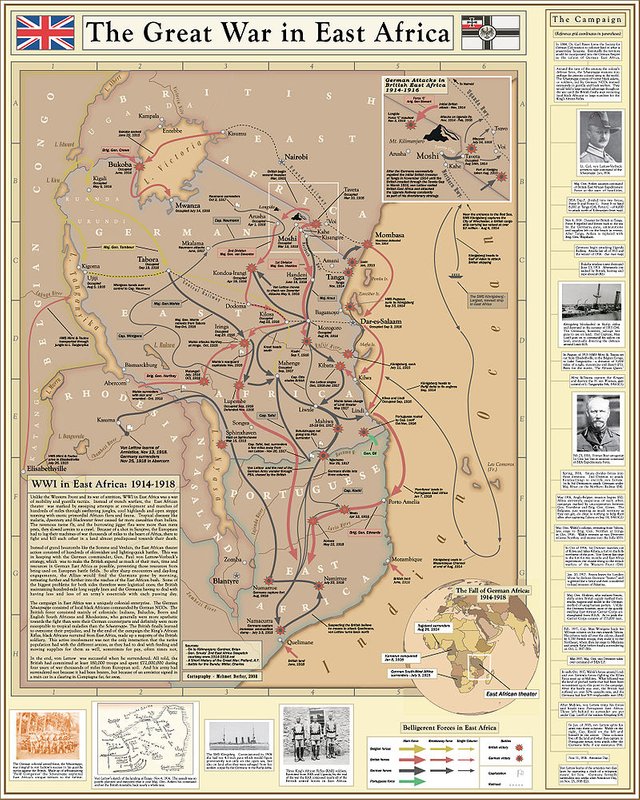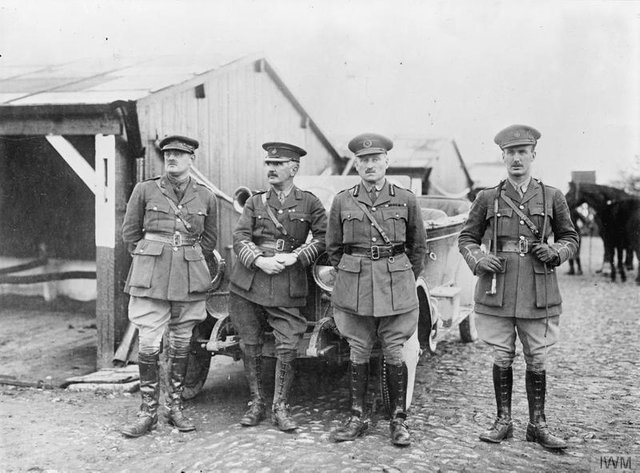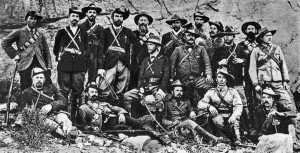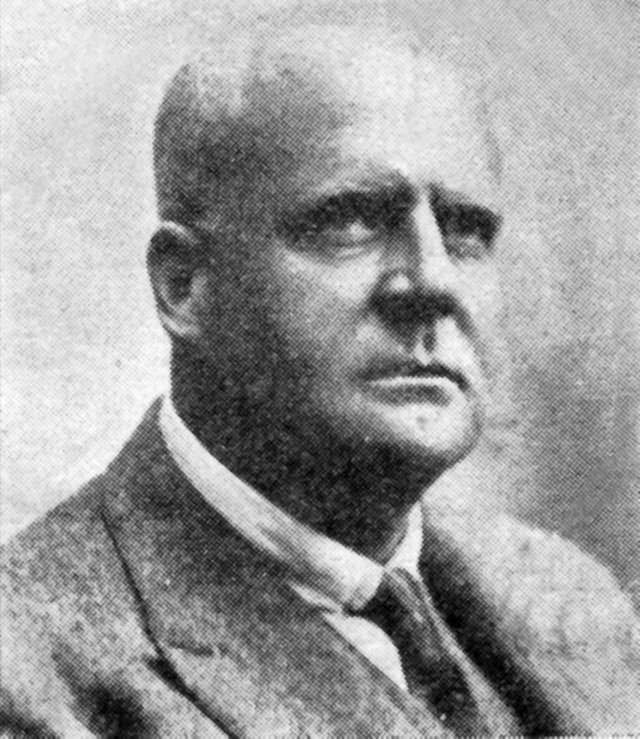Interpretation of history can be irritating

(German East Africa during the WW1 campaign)
I am watching a magnificent ten part series on the First World War.
It makes much use of the accounts of various people involved in various campaigns. It is skillfully put together and I can't stop watching it. It drives the rest of the family nuts, so I have retreated to my bedroom where I watch it on my laptop with earphones.

I have got to the part where it speaks about the involvement of South Africa. It was fairly well done but from my readings, it is quite a paltry effort. They did speak a bit about the Boer War at the turn of the 19th century. They glossed over the atrocities committed by the British but did mention the resultant hostile attitude of many Boer South Africans. When the leaders of the young South African Union, Louis Botha and Jan Smuts, decided to support Britain in the war against Germany, a civil war erupted. Smuts cleverly kept the English South Africans out of the conflict and only used his own Boer supporters against the rebels. Great restraint was used in overcoming the armed resistance and there were very few casualties.

(called the Bitter einders - these Boers fought the British to the very end, many left the country never to return after the Boer War)
Very little is told apart from a revolt from a section of the South African army who defected to join the German Forces. South West Africa is a desert and a skillful campaign was conducted by Botha and Smuts over vast regions. The German Forces were insignificant in size and the lack of water was the greatest foe. When the German forces were compelled to surrender, Britain made much of it in wild celebrations; they were starved for good news, as there was scant good news in the War with Germany.
Further use was made of Smuts to lead the fight against the Germans in East Africa. The German commander was Lieutenant-Colonel Paul von Lettow-Vorbeck. When Vorbeck was planning how to assist Germany, he decided the best campaign he could conduct that would help his country in Europe was to divert as many British forces into Africa as he could. The terrain was difficult - mountains, deserts, jungles, rain and of course the dreaded Tsetse fly. He would not fight head to head in a conventional pitched battle to the end but rather conduct almost a guerrilla campaign. There were no roads, no maps and no communications, Vorbeck knew the country well as he and his small band of German troops had been there for years, their knowledge was a tremendous advantage.

(just picked this map to show some of the complexities of the area - European intrigues, that is)
Smuts was given a British Intelligence Officer, Richard Meinartzhagen, who complained about Smuts not being clever enough to capture Vorbeck. He also said that the campaign conducted by Smuts cost Britain millions of Pounds and the lives of hundreds of soldiers due to the hostile climate, like malaria. Smuts stated that he did not really want to confront Vorbeck as the war was deeply unpopular in South Africa and he did not want to be known as Butcher Smuts. The documentary concluded Smuts was a great statesman and just a fairly average general. He was a strong supporter of the British Empire, hence the British may have regarded him as a great statesman for that reason.
This is where I take exception to their casual analysis.
I have read other books about the campaign. Admittedly one of them was written by a supporter of Smuts, Deneys Reitz but his impartial style of writing has made his books, such as "Commando" and subsequent writings, highly regarded by readers in general.

(Deneys Reitz)
Smuts used to travel around in his car, to all areas of the campaign, continually visiting and helping his soldiers. His visits always lifted morale. His soldiers developed a great love and respect for him.
The terrain was hellish, rinderpest killed over 50 thousand horses and about 200 thousand native porters died, one in five. Thousands of soldiers were ill and repatriated back to South Africa. Soldiers from West Africa were the replacements. I know also from some brief accounts from my Grandfather (on my Dad's side) who was in the same campaign, that they used to march day and night to catch the wily German. Grandpa Spuddy said that they would march in columns, the man in the front was awake and would guide his troop. Each soldier behind would put his hand on the shoulder of the man in front and sleep as they marched. At regular intervals, the front fellow would go to the back of the column and sleep while the fellow who was second would have to be awake and guide the column further.
The campaign devastated the land of Africa through taking men away from their families and soldiers just taking their food. The dreadful losses of the local inhabitants cannot be reliably estimated from the war, a rough estimate is that two to three million black people died due to a far away war in a land they had never even heard of.
My thoughts:
- Smuts did not want the South African troops killed for Britain. I believe he was keeping many troops out of the meat grinder of European War. My Grandfather Spuddy had three brothers who all went to Europe and fought. Some were even at Delville Wood where terrible losses of men were suffered. It was miraculous but all four brothers survived the First World War and returned home to Cape Town.
2)Smuts was a political leader who had a vision for South Africa, it required the support of Britain and her vast economy. South Africa's participation in the War, supporting Britain created a bond of gratitude and support back to South Africa. - The British Intelligence Officer was prejudiced as all imperialists were, believing that all other nations were inferior; Smuts certainly would have been regarded with a jaundiced eye.
- How exactly could the campaign have been better conducted? We look at countries like Vietnam and Afganistan, where people are prepared to resist a larger armies that are much better equipped. I saw no success there either for the occupiers.
- Smuts was a seasoned campaigner, he himself with a small band of poorly equipped starving Boer soldiers, kept close to half a million British soldiers chasing him without success. Smuts had also conducted a successful campaign against the Germans in South West Africa that was rapid in its conclusion)
To me it is clear that Britain did not really need these troops in their European theatre, that number of soldiers would not come close to matching the vast losses suffered in even one of Haig's attacks on German positions in France. Maybe the losses were insignificant to Haig but they would have been devastating to a small country like South Africa.
So no, I think Smuts was brilliant in his vision and future plans for South Africa. His will was focused and he was ruthless in his determination to realise these dreams. He was cautious in revealing them to others, so very few people ever knew what his innermost ideas were. As we say, "he kept his cards close to his chest"
Good additional knowledge of history. It is always very interesting to read. Thank you .
Sir @fred703 you have nicely described the great World war 1 history in South Africa. World war is the biggest curse for humanity. Some people always try to control others freedom which is the main cause of all war.
Interesting information for me. I fully share your opinion. Smuts was a good strategist
If I get a chance I shall travel in Africa.
Ohhhh This is very interesting history.This is great history.I always happy to read history.I always like your post.Thanks for sharing.dear.
World war history is the most pathetic history in the world. I hate war.
Hello Friend how are you? a few days ago I do not pass through here this update of Steemit left us a little disabled
I like the programs of the first world war see what they did and how they lived it is interesting to see what happened in that time the truth is that I do not follow those programs the cable TV in my country looks horrible so I do something complicated
I see that you go further and you know how to analyze very well
Really Emily Hobhouse is the role model for womens. Her sacrifice for humanity always rememberable. Thanks sir @fred703 for the valuable content.
To listen to the audio version of this article click on the play image.

Brought to you by @tts. If you find it useful please consider upvoting this reply.
Many many thanks for increase our knowledge about africa.